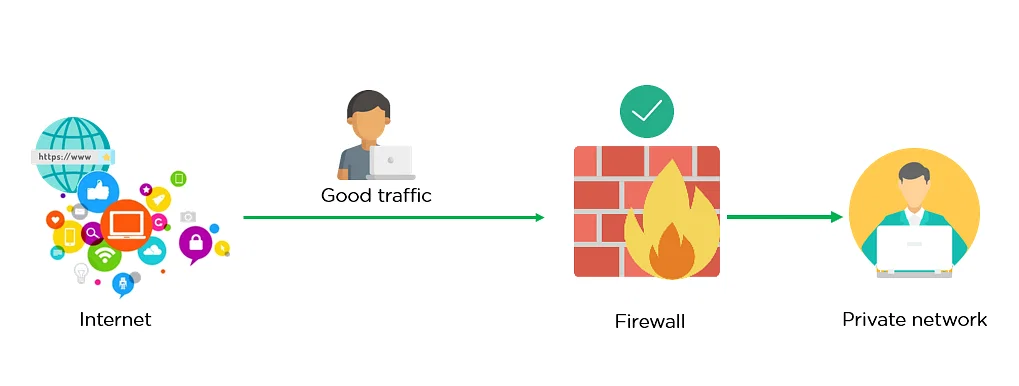What is a firewall?
A firewall is a type of network security device that blocks users from gaining access to the network without permission. It monitors both incoming and outgoing data packets for malicious activity according to a predetermined set of rules. A firewall can be any of several different types of technology, including physical hardware, digital software, SaaS, or a private cloud.
Many devices, including Macs, Windows desktops, and Linux servers, already have a firewall installed for further security. They’re a standard requirement for any serious network.
what does a firewall do
A firewall is a barrier designed to filter and control the flow of data between networks, devices, or applications. Think of it as a virtual gatekeeper, meticulously examining incoming and outgoing traffic to ensure only authorized data passes through.
In the realm of computers, firewalls stand as the first line of defense against cyber threats. They analyze network traffic, monitor for suspicious activities, and act as a shield against malware and unauthorized access.
Why Are Firewalls Important?
Firewalls are the first line of defense against things like hackers and malware strikes that come from the outside. When used with an intrusion protection system (IPS), they are especially important for stopping malware and some application layer attacks.
In the early days of the internet, these security tools grew out of the need for stronger security measures as the network grew more complicated. Today, they are the most important part of network security in the client-server model, which is one of the most important computer architectures.
Overall, firewalls are one of the most important ways to stop cyber attacks, protect personal data, and keep computer systems and networks private and safe.

How Does a Firewall Work?
A firewall establishes a protective boundary between an external network and the network it guards. It intercepts all packets entering and leaving the protected network and scrutinizes them based on predefined rules to distinguish between benign and malicious traffic.
Packets, the data units formatted for internet transmission, contain both data and information about their origin. Firewalls leverage this packet information to determine compliance with the rule set. Non-compliant packets are denied entry into the secured network.
Rule sets can be based on packet data attributes such as source, destination, and content, which can be represented differently at various network levels. Different types of firewalls exist to inspect packets at different network layers.
To appreciate the functionality of firewalls, we delve into their inner workings, including packet filtering, stateful inspection, and proxy firewalls.
- Packet Filtering: Packet filtering involves scrutinizing data packets based on predefined rules, permitting or denying their passage.
- Stateful Inspection: Stateful inspection examines the state of active connections, ensuring data packets belong to valid sessions.
- Proxy Firewalls: Proxy firewalls act as intermediaries, handling requests on behalf of internal devices, further enhancing security.
Types of Firewalls
Firewalls come in various forms, each with its own strengths. Let’s explore the different types, from hardware to next-generation firewalls.
- Hardware Firewalls: Hardware firewalls are standalone devices, ideal for protecting entire networks.
- Software Firewalls: Software firewalls are applications installed on individual devices, granting users control over their security settings.
- Next-Generation Firewalls: Next-generation firewalls blend traditional firewall features with advanced security capabilities, such as intrusion prevention and application awareness.
Also, Firewalls can be categorized based on their filtering methods and the systems they protect
Categorization by What They Protect
- Network-Based Firewalls: Guard entire networks and are often implemented as hardware solutions.
- Host-Based Firewalls: Protect individual devices (hosts) and are typically software-based.
Categorization by Filtering Method
- Packet-Filtering Firewalls: Examine individual data packets in isolation without considering their context. They operate primarily at the network layer and are susceptible to IP spoofing attacks.
- Stateful Inspection Firewalls: Monitor communication packets over time and inspect both incoming and outgoing packets. They maintain a table of open connections and are more effective but still vulnerable to denial of service attacks.
- Circuit-Level Gateway Firewalls: Examine TCP handshaking between packets from trusted clients/servers and untrusted hosts. They operate at the session level and can prevent certain attacks but don’t inspect packet content.
- Application Layer and Proxy Firewalls: Offer application layer filtering, examining packet payloads to distinguish between valid requests and malicious code. They provide granular control over network traffic and can run on proxy servers.
- Next-Generation Firewalls (NGFWs): Combine traditional firewall capabilities with intrusion prevention and application control. They offer a multilayered approach to security, covering various threats, including advanced malware attacks.
- Virtual Firewalls: Run within virtualized environments and provide security and inspection capabilities akin to hardware firewalls.
- Cloud-Native Firewalls: Designed for cloud-based infrastructures, they offer traffic filtering and monitoring for virtual machines (VMs) and containers.
Each type of firewall examines traffic with varying levels of context, with NGFWs offering the most comprehensive protection.
What Is the Purpose of a Firewall?
The primary purpose of a firewall can be summarized in one word: security. Its job is to enhance the security of your digital environment by:
- Filtering Traffic: A firewall filters network traffic, allowing only legitimate data packets to pass through while blocking or flagging suspicious ones.
- Preventing Unauthorized Access: It acts as a barrier against unauthorized access attempts, thwarting hackers and cybercriminals from infiltrating your system or network.
- Detecting and Blocking Threats: Firewalls are equipped with sophisticated algorithms that can identify and block a wide range of threats, from malware and viruses to phishing attempts.
- Implementing Access Control: They enable you to define access rules, specifying who can access certain resources and from where granting you granular control over your network’s security.
- Logging and Reporting: Many firewalls maintain detailed logs of network activity, providing valuable information for security audits and incident response.
Advantages of Firewalls
- Improved Security: The primary advantage of firewalls is enhanced network security. They can filter and monitor incoming and outgoing traffic, allowing only authorized and safe data packets to pass through, while blocking or logging potentially harmful ones.
- Access Control: Firewalls enable administrators to define and enforce access control policies. This means you can specify who can access specific resources or services, providing an added layer of security against unauthorized access.
- Protection Against Cyber Threats: Firewalls can defend against a wide range of cyber threats, including malware, viruses, worms, and Trojans, by blocking known malicious IP addresses and traffic patterns.
- Logging and Auditing: Many firewalls offer logging and auditing capabilities, allowing you to review network activity and identify potential security breaches or policy violations.
- Content Filtering: Some firewalls provide content filtering features, which can be used to block access to specific websites or types of content, helping to enforce acceptable use policies.
- Privacy: Firewalls can protect the privacy of your internal network by preventing unauthorized external entities from gaining access to sensitive information.
- Network Segmentation: Firewalls can be used to segment networks into separate zones, enhancing security by isolating critical systems from less secure ones.
- Application Layer Inspection: Advanced firewalls can inspect traffic at the application layer, allowing for more granular control and protection against application-specific vulnerabilities.
Disadvantages of Firewalls
- False Positives: Firewalls may sometimes block legitimate traffic or applications, leading to false positives. This can be frustrating for users and may require ongoing monitoring and tuning.
- Complex Configuration: Setting up and maintaining firewalls can be complex, especially for organizations with large and diverse network infrastructures. Misconfigurations can lead to security holes or disruptions in network services.
- Resource Intensive: Deep packet inspection and complex rule sets can consume significant computational resources, potentially affecting network performance.
- Evading Techniques: Skilled attackers may find ways to bypass or evade firewall protections, making it important to complement firewalls with other security measures.
- Single Point of Failure: If not properly configured or redundant, a firewall can become a single point of failure in a network. If it fails, it can leave the network vulnerable.
- Cost: High-quality firewall solutions can be expensive to acquire and maintain, especially for small businesses or individuals.
- Limited Protection for Insider Threats: Firewalls are primarily designed to protect against external threats, so they may not provide adequate protection against insider threats or attacks originating from within the network.
- Constant Updates: To remain effective, firewalls require regular updates to their rule sets and signatures, which can be time-consuming.
firewalls are crucial for safeguarding networks, but they come with their own set of advantages and disadvantages. Organizations need to carefully plan and configure firewalls to strike a balance between security and usability while considering the specific needs of their network environment.
What Is a Firewall in Computer Systems?
In computer systems, a firewall plays a pivotal role in safeguarding your device from malicious entities lurking on the internet. It examines the data entering and exiting your computer, scrutinizing it for signs of malware, viruses, or suspicious activities. When it detects something amiss, the firewall springs into action, preventing potential threats from infiltrating your system.
What Is a Firewall in Networking?
Now, let’s scale things up a bit. In networking, a firewall serves as a guardian for entire networks, not just individual devices. It’s like the sentry at the gates of a bustling city, scrutinizing every person (or data packet) seeking entry. Monitoring network traffic ensures that only authorized data flows in and out, protecting the network from cyberattacks and unauthorized access.
What is WAF (Web Application Firewall)?
In the online arena, web applications are the crown jewels. Web Application Firewalls (WAFs) act as specialized sentinels, safeguarding these jewels from web-based threats such as SQL injection and cross-site scripting.
WAF vs. Traditional Firewalls
WAFs are not your run-of-the-mill firewalls. They are tailored to protect web applications specifically. Unlike traditional firewalls, they understand the nuances of web traffic, making them adept at detecting and thwarting web-based attacks.
Firewall in the World of IoT
In the rapidly evolving Internet of Things (IoT) landscape, firewalls are essential to secure the interconnected devices that surround us. They ensure that your smart thermostat, fridge, or even your wearable device remains protected from cyber threats, preserving your privacy and security.
Firewall Vendors
When choosing a firewall, organizations should understand their specific needs and network architecture. Various firewall types and features are offered by different vendors, including Barracuda, Cisco, Fortinet, Palo Alto Networks, SonicWall, and Sophos, among others.
Frequently Asked Questions
The main purpose of a firewall is to act as a barrier between your trusted network and the untrusted outside world, filtering incoming and outgoing traffic to protect against cyber threats.
No, there are various types of firewalls, including software and hardware firewalls, each with its own strengths and use cases.
Yes, a firewall and antivirus software serve different purposes. While antivirus software focuses on identifying and removing malware on your device, a firewall prevents unauthorized access and network threats.
Yes, firewalls are crucial for securing IoT devices, ensuring that your smart appliances and gadgets remain protected from cyber threats.
Common misconceptions include believing that a firewall alone guarantees cybersecurity and not realizing that a comprehensive approach to cybersecurity is necessary.




